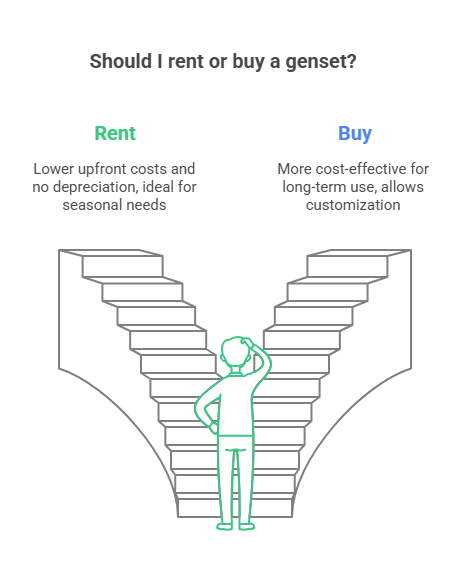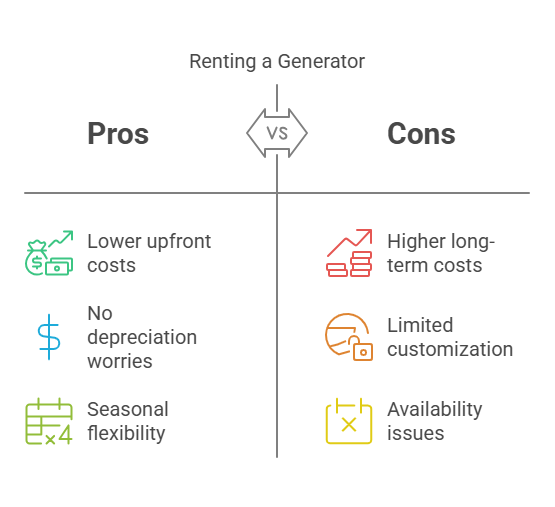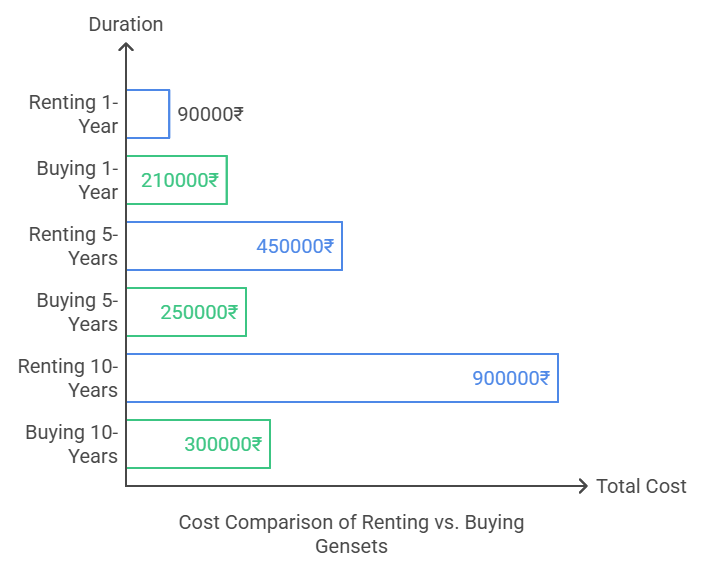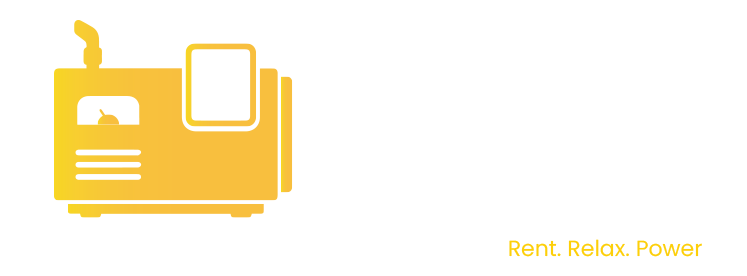Your construction site loses power for the third time this month. Deadlines are looming, workers are idle, and every minute of downtime is bleeding money. Or maybe you’re organizing an outdoor wedding, and a sudden storm threatens to turn your dream event into a dark, silent disaster. In moments like these, a genset on rent or a purchased generator can be the difference between chaos and calm. But which option makes financial sense for you?
The debate between renting and buying a generator isn’t just about upfront costs—it’s about flexibility, maintenance, and long-term value. Whether you’re a project manager, event planner, or homeowner, this guide will break down the pros, cons, and hidden costs of genset on rent versus buying, so you can make a decision that powers your goals without draining your budget.

Why the “Genset on Rent vs. Buy” Debate Matters
Generators (or gensets) are critical for bridging power gaps, but their costs go beyond the price tag. Let’s face it: Most of us don’t need a generator 24/7, but when we do need one, reliability is non-negotiable. Genset on rent services offer temporary solutions, while buying promises ownership and control. But which is smarter for your wallet?
The answer depends on three key factors:
-
How often you’ll use the generator (e.g., daily vs. once a year).
-
Your budget (upfront costs vs. recurring rentals).
-
Your capacity to maintain and store the equipment.
Let’s dive into the nitty-gritty.
The Case for Renting a Genset: Flexibility Without the Baggage
Renting a generator is like borrowing a power-packed safety net—you pay for what you need, when you need it. Whether you’re managing a short-term project or prepping for seasonal demands, genset on rent services shine in these scenarios:
1. Short-Term Projects or Events
-
Construction sites: Need power for 3–6 months? Renting avoids long-term commitments.
-
Outdoor events: Concerts, weddings, or festivals requiring temporary setups.
-
Emergency backups: Sudden grid failures during storms or heatwaves.
2. Cost Savings on Maintenance and Storage
-
No repair bills: Rental companies handle servicing, oil changes, and parts replacement.
-
Zero storage hassle: Return the genset once your project wraps up.
-
Access to newer models: Upgrade to fuel-efficient or quieter units as needed.
3. Test Before You Invest
Not sure which generator suits your needs? Renting lets you “try before you buy,” especially if you’re considering a purchase later.
Pros of Renting a Genset:
-
Lower upfront costs (pay per day/week/month).
-
No depreciation worries.
-
Ideal for unpredictable or seasonal needs.
Cons of Renting a Genset:
-
Long-term rentals may cost more than buying.
-
Limited customization (e.g., specific fuel types or noise levels).
-
Availability issues during peak demand (e.g., storm season).
The Case for Buying a Generator: Ownership Pays Off Over Time
Buying a generator is like investing in a loyal power guardian—it’s always there, ready to kick in when disaster strikes. For businesses or homeowners with frequent outages or long-term needs, ownership often beats renting.
1. High Frequency of Use
-
Daily operations: Farms, hospitals, or factories needing uninterrupted power.
-
Chronic grid instability: Areas with regular blackouts (e.g., 10+ outages yearly).
2. Customization and Control
-
Tailored specs: Choose fuel type (diesel, propane, solar), noise levels, or smart features.
-
Immediate access: No waiting for delivery during emergencies.
3. Long-Term Cost Efficiency
While the upfront cost is steep (₹50,000 to ₹5,00,000+ in India), buying pays off over 5–10 years. Example:
-
Purchase cost: ₹2,00,000 (10kVA diesel genset).
-
Rental cost: ₹3,000/day.
-
Break-even point: If used for 67 days, buying becomes cheaper.

Genset on Rent vs. Buying: Cost Comparison Breakdown
Let’s crunch numbers to see which option wins financially.
| Scenario | Renting | Buying |
|---|---|---|
| 1-Year Use (30 days total) | ₹3,000/day x 30 = ₹90,000 | ₹2,00,000 + ₹10,000 maintenance = ₹2,10,000 |
| 5-Year Use (150 days total) | ₹90,000/year x 5 = ₹4,50,000 | ₹2,00,000 + ₹50,000 maintenance = ₹2,50,000 |
| 10-Year Use (300 days total) | ₹9,00,000 | ₹2,00,000 + ₹1,00,000 maintenance = ₹3,00,000 |
Verdict:
-
Short-term (≤1 year): Rent.
-
Long-term (5+ years): Buy.
-
Moderate use (2–4 years): Compare cumulative rental costs vs. purchase + maintenance.

5 Questions to Ask Before Deciding “Genset on Rent or Buy”
Still torn? Answer these to clarify your needs:
-
“How many days per year will I use the generator?”
-
<30 days → Rent.
-
60 days → Buy.
-
-
“Do I have space to store a generator?”
Small apartments or urban offices may lack storage. -
“Can I handle maintenance?”
DIY skills? Time? Budget for professional servicing? -
“Are my power needs likely to change?”
Expanding a business? Moving soon? Renting offers flexibility. -
“What’s my emergency backup plan?”
If the grid fails, how quickly can a rental be delivered vs. your owned generator starting u
When Renting a Genset is a No-Brainer
-
Seasonal Demand
Farmers needing irrigation power for 3 months/year. -
Trial Projects
Testing a new construction site or pop-up business. -
Avoiding Obsolescence
Tech evolves fast—rent to access newer models without selling old units.
When Buying a Generator Wins
-
Frequent Outages
If your area has weekly blackouts, ownership ensures instant response. -
Custom Requirements
Need a solar hybrid genset or ultra-quiet model for residential use? Buy. -
Long-Term Savings
High upfront cost but lower lifetime expenses.
Why Choose Rental Genset for Genset on Rent or Purchase?
At Rental genset, we don’t just sell generators—we empower your peace of mind. Whether you need a genset on rent for a weekend event or a permanent solution for your factory, here’s why we’re the trusted choice:
-
Rentals Tailored to You: Choose from 50+ models (diesel, solar, silent) with flexible durations.
-
Transparent Pricing: No hidden fees—rental quotes include delivery, setup, and pickup.
-
24/7 Emergency Support: Power crisis at midnight? We’ve got your back.
-
Buy with Confidence: Our generators come with 5-year warranties and free first-time maintenance.
